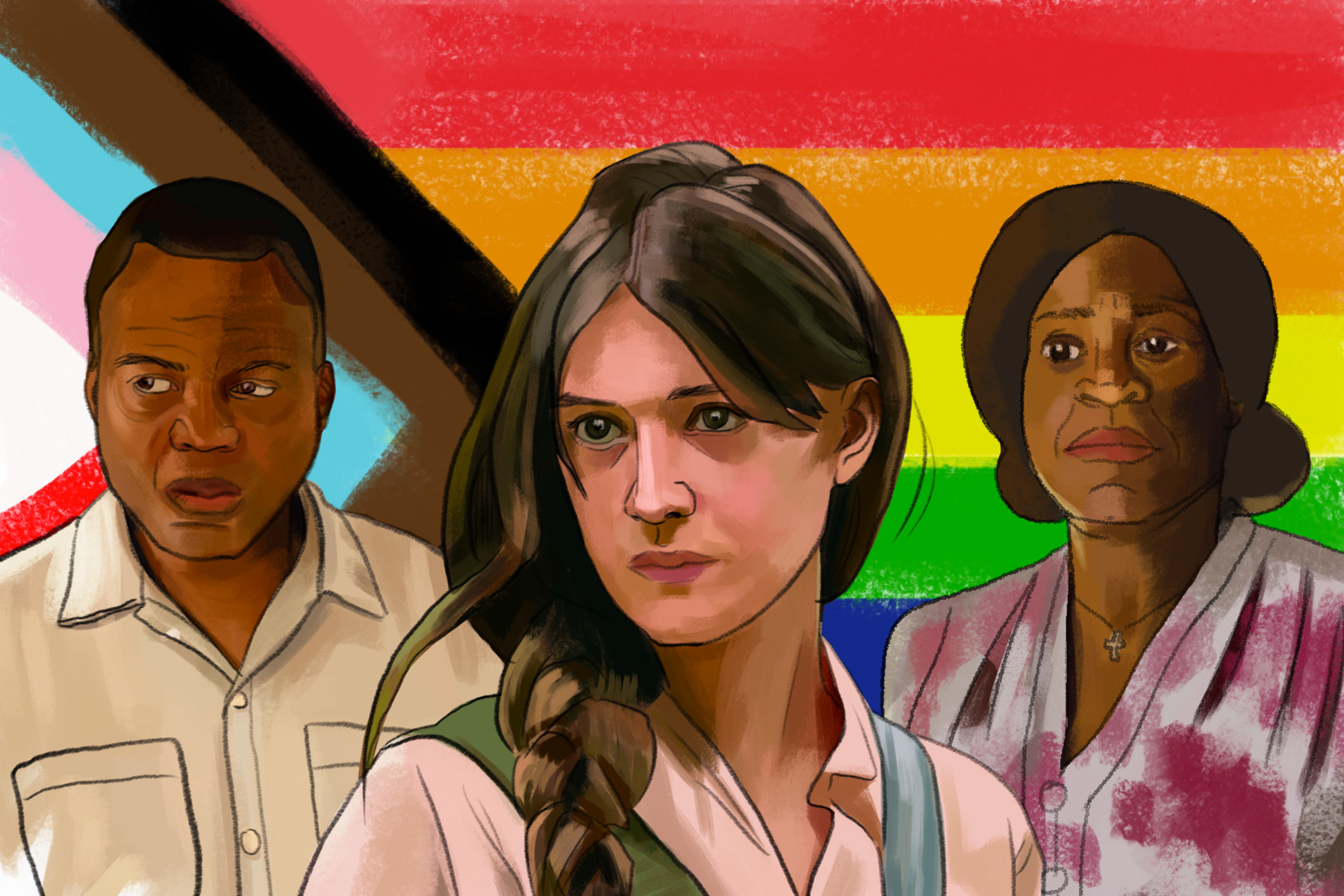The film adaptation of Delia Owen’s 2018 novel, “Where the Crawdads Sing,” follows the life of Kya, a young woman growing up in mid-20th-century North Carolina. The film itself only features two characters of color, the neighboring couple Mabel and Jumpin, who watch out for Kya as supporting familial figures.
I went into “Where the Crawdads Sing” out of curiosity. I knew it had a female director, Reese Witherspoon was a producer, there was an original song from Taylor Swift, and I wanted to support Daisy Edgar Jones’ rise to stardom. While the film features an almost entirely straight, white, cisgender cast of characters, the moment I left the film I knew one thing: The compelling story of Kya is a rare one that LGBTQ+ and POC audiences can relate to.
Though Kya is white, straight and cisgender herself, she is a true outsider. Not just an outcast or “not like other girls” — she is literally not like other girls. Kya is a victim of familial abuse; abandoned, uneducated and rejected from her community, she is forcibly self-reliant, undersocialized, inexperienced romantically, and entirely vulnerable. In every way, Kya’s lived experience is identifiable with those of the LGBTQ+ and POC communities. Although she inevitably benefits from the privileges of her whiteness, heterosexuality, and cisgender identities, the essence of her character and experience remains relatable.
Essentially, she has struggled. Kya experienced levels of trauma traditionally reserved only for those of us who fail to find a place in social structures that were made to accommodate the cisgender, white and heterosexual.
I identified with Kya in ways I hadn’t anticipated. I rarely find myself within characters of historical fiction because I’m a transgender woman who never forgets the horrors of the past and the need to live today. Honestly, I ought to identify most with fiction foretelling the future, a genre where I could just maybe actually imagine a better tomorrow. It’s no wonder the first appearance of Wakanda in “Black Panther” was so transcendent to Black audiences — it conceived a thriving African nation that was void of colonization, imperialism and exploitative brutality. Though most media has rarely been so proactive and thoughtful in its portrayals of diverse characters, the marginalized rarely waste time romanticizing the past.
Yes, for the sake of the fabulous most of us would affirm the fashion and the music, but we know better than to want to travel in time. A remarkable trip back in time would only truly benefit the privileged cisgender and white time traveler.
One could argue that the original novel could and perhaps should have been reworked with a more diverse cast of characters. However, though Kya is no Black Panther, at least not literally on screen, her life story definitely is.
Abandonment and Self Resilience
One by one every member of Kya’s family leaves her. Her father is an abusive alcoholic and wreaks havoc on the lives of the entire family. With the agency and rare opportunity to leave, Kya’s mother and each of her siblings leave her. Left alone with her father, Kya conditions herself to learn from those that came before and survived. She is less than 10 years old when the majority of her family abandons her, and she has no choice but to stay with her abusive father. She learns to evade his line of sight, appease him and literally fend for herself in the dangerous marshland.
Abandonment and the need to navigate terrifying acts of abuse are tragic staples of many experiences within the LGBTQ+ and POC community; the only critical difference here is that Kya’s family didn’t abandon her on the grounds of her sexuality, gender identity, or truly any source of identity. They also all had the agency and privilege of whiteness upon reentering society outside their abusive home. Kya’s self-reliance derived from abuse and abandonment is a defining trait of any minority group’s lived experiences. The concept of childhood and role models is a privilege too many take for granted. At age 10, Kya became fully independent and grew up far quicker than her peers; this early maturity is difficult to grapple with.
Life as an Outsider
With the promise of a real meal, Kya attends school, albeit without shoes. However, she is belittled and labeled “Marsh Girl” by her peers without any intervention from her school teacher. She retreats to the marsh never to return to school. This response is one so many people of color and members of the LGBTQ+ community can relate to, especially in the school system where hyper conformity is enforced socially at the highest level. Integral to her life as an outsider, the nuances of her experiences and outlook are by far the most relatable aspects of her character. I personally adore this moment not because of Kya’s pain but for the honest portrayal of an outsider’s fragility.
To many, attempting something only once and refusing to make a second attempt is ignorant and weak — but that is judging said action without a measure of pain and trauma. People of color, the LGBTQ+ community and outsiders at large are constantly told, “You’re so brave.” We’re commended for our strength to withstand the obstacles of a world not made to accommodate us.
What is not addressed at the same level is our fragility. Those in positions of privilege love to marvel at us; essentially, their celebration of our bravery indirectly poses the question, “How do you do it?,” as they might not truly know how we do. Unless all of the focus is on our strength despite the odds, we’re not given the capacity to be fragile. We’re not allowed to be weak, and when we are, they notice we’re not up to par. I would bet that every student in that classroom that belittled Kya as the “Marsh Girl” felt vindicated when she never returned to class. In their ignorant little minds, they were proven right — she couldn’t sit with them and she couldn’t be them, not without any shoes or confidence. This twisted bullying and mindset in the end only validates their belief in their own superiority. The nuance of this oppression is more relatable to me than words can convey. The only way this ignorance is proven wrong is when we prove it wrong. The moment we rise above every obstacle and operate on the same level (often even better) than our privileged peers is finally when we’re sometimes treated with some respect.
Pursuit of Romance
Kya’s isolation and dangerously low level of socialization is a quality I identified with the most. The privilege of a supportive childhood confers not just the agency that stems from confidence but integral social skills. When children grapple with deep gender and sexual identity conflicts, they can’t access the same confidence or support as their straight peers. For the majority of the first 12 years of my life, I had no personality. I was a shell of a person. Any ounce of flair and fabulosity I had as a dancing, expressive child was stripped away as years went by. Like Kya, I did not identify with those around me, and I relied upon myself whenever possible. However, this made the transition to romance alarmingly difficult for the both of us.
Navigating male attention is deeply troubling for Kya. One love interest, Tate, teaches her how to read and they fall in love through their adventures in the marsh. However, like everyone else she lets into her life, he leaves her. For the first time since she was 10, Kya truly opened her heart and was betrayed in the same manner as before. Her next relationship is different and alarming from the start; high school quarterback Chase Andrews meets Kya on the marsh in his blue speedboat. He manipulates her in every way possible, but she doesn’t have the agency or experience to truly understand until the relationship unfolds into a string of abuse and lies. The innate lack of socialization prompted by the trauma she’s faced makes Kya entirely vulnerable to the heartbreak and dangers of romance.
Kya is not the first character LGBTQ+ and POC audiences have identified and strongly responded to — the film’s producer Reese Witherspoon’s iconic role as Elle Woods is a prime (and brilliantly pink) example. Yet the raw honesty in the storytelling of one’s life experiences allows LGBTQ+ and POC audiences to see themselves in a character otherwise nothing like them. A familiar but entirely limited opportunity — often all we can relate to on screen is the struggle of a character more privileged and frankly only similar to us because of their struggle.
















